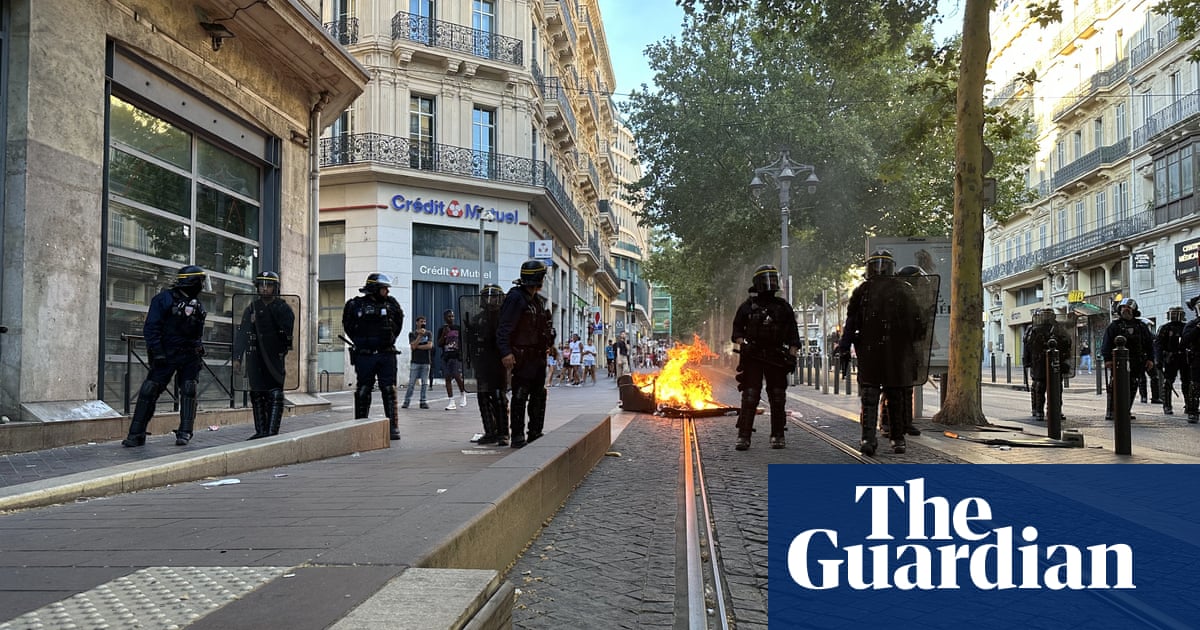
Emmanuel Macron is facing a backlash after threatening to cut off social media networks as a means of stopping the spread of violence during periods of unrest.
Élysée officials and government ministers responded on Wednesday by insisting the president was not threatening a “general blackout” but instead the “occasional and temporary” suspension of platforms.
The president’s comments came as ministers blamed young people using social media such as Snapchat and TikTok for organising and encouraging rioting and violence after the shooting dead of a teenager during a police traffic stop in a Paris suburb last week.
“We need to think about how young people use social networks, in the family, at school, the interdictions there should be … and when things get out of hand we may have to regulate them or cut them off,” Macron told a meeting of more than 250 mayors, whose municipalities were hit by the violence, on Tuesday.
“Above all, we shouldn’t do this in the heat of the moment and I’m pleased we didn’t have to. But I think it’s a real debate that we need to have in the cold light of day,” Macron told the mayors in a video obtained by BFM television.
Critics said considering such measures would put France alongside authoritarian countries such as China, Russia, Iran and North Korea.
Olivier Faure, the leader of the Socialist party, tweeted: “The country of the rights of man and citizens cannot align itself with those great democracies of China, Russia and Iran.”
Olivier Marleix, from the centre-right Les Républicains, added: “Cut social media? Like China, Iran, North Korea? Even if it’s a provocation to distract attention, it’s in very bad taste.”
Fatima Ouassak, co-founder of the Front de Mères (Mother’s Front) collective representing parents in the working-class banlieues, said the issue was a distraction.
“It’s a diversion tactic. Instead of debating the issue of police violence … we are diverting to the responsibility of the social media networks and parents,” Ouassak told BFM television. “It’s secondary and about the authorities avoiding their responsibility.”
An Elysée source insisted Macron had “at no moment said he envisaged cutting the network in the sense of a general blackout”. The president had made it clear he wanted a “calm and considered” debate about the role of social media on the recent unrest, the source said.
“The president thinks we should be reflecting about the use of the social media networks and what basis there could be for eventual bans or administrative measures.”
Speaking after a ministerial meeting on Wednesday, government spokesperson Olivier Véran said a cross-party committee to look at a modification of a law on cybersecurity currently going through parliament would be set up.
Véran said the government had made a “firm request” to social media platforms to take down materials encouraging violence as quickly as possible and remove the anonymity of those possibly breaking the law.
“A young person should know he cannot sit behind his screen and write, organise or do whatever he wants. Anonymity in terms of offences doesn’t exist. You have to understand this can have consequences and the consequences can lead to punishment,” Véran said.
Asked if it meant suspending social media, the Véran added: “It could be something like suspending a function, such as geolocalisation.”
The government has battled riots and looting since a police officer fatally shot 17-year-old Nahel M during a traffic stop on 27 June, rekindling longstanding accusations of systemic racism among France’s security forces.
A 38-year-old police officer has been officially put under investigation – the French equivalent of being charged – for voluntary manslaughter and is being held in custody.
As France reflects on how to avoid further social turbulence amid accusations of systemic racism in the police and in the wider society, one of the country’s most senior right-wing politicians was accused of “crass racism” by claiming those taking part in the riots had undergone “a regression to their ethnic roots”.
Dismissing interior minister Gérald Darmanin’s report to the Assemblée Nationale that 90% of those arrested were French, Bruno Retailleau, who heads the mainstream right Les Républicains party in the Sénat, said this was not “their identity”.
“Unfortunately, for the second and third generations [of immigrants], there is a sort of regression towards their ethnic roots,” he told FranceInfo.
Afterwards, Mathilde Panot, parliamentary leader of the hard-left La France Insoumise (LFI – France Unbowed) denounced the remark as “crass racism”. Another LFI MP, Clémentine Autain, added: “these people, oozing racism, dare give lessons about good republican behaviour.”
As the violence appeared to be dropping – with 17 arrests overnight Tuesday, seven in Paris – the transport minister, Clément Beaune, announced public transport services, halted at 9pm to persuade people to stay at home, would return to normal on Wednesday. In the Île-de-France region the damage to buses and trams, several of which were set alight, is estimated at about €20m.
French prosecutors have opened an investigation into the death of a 27-year-old man who was hit by a projectile during riots and pillaging in Marseille on Saturday. The man is believed to have died from a violent shock to the chest from a “flash-ball” used by riot police that led to a cardiac arrest.
Prosecutors said it was not possible to determine where the man was when he was hit or whether he had taken part in the riots.
Flash-ball guns are designed to be non-lethal riot control weapons that do not penetrate the skin. Their use by police in France is disputed as the projectiles have led to the loss of eyes, head injuries and other trauma.
The EU justice commissioner, Didier Reynders, on Wednesday said that violence in France, by some police officers and demonstrators “poses a problem”, in comments to Belgian radio.
“It is striking” that a “very high level of violence” was seen in protests in France in recent years over cost of living, pension reform and last week’s police killing of a teen driver, he told Belgian public radio RTBF.
Reynders said the issue was with “a certain number of police officers … [and] the behaviour of people who have the right to freely protest – that’s a fundamental right – but not to loot shops, to destroy stores, not to destroy public equipment”.












